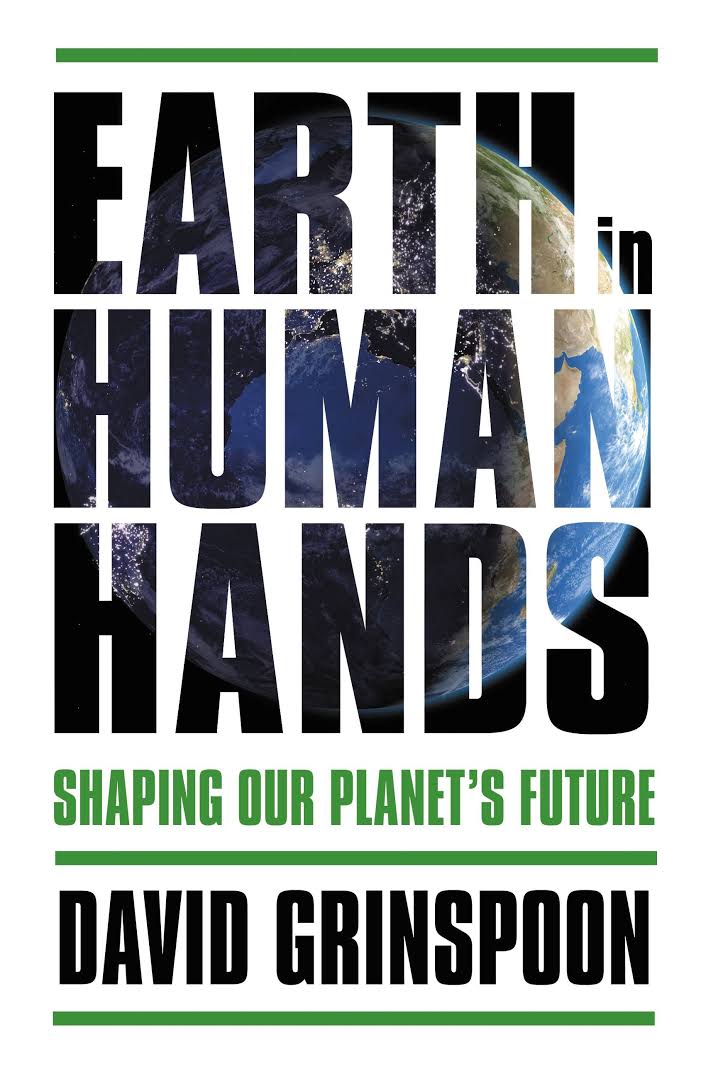Dr. David Grinspoon was the speaker at the January meeting of the Rose City Astronomers and I’ve just finished reading his new book, “Earth in Human Hands” and want to tell you about it.
The obvious central theme of the book is that we humans need to solve the problem of climate change, but it explores this and many related topics in great depth and from many perspectives. Since I am not nearly as skillful a writer as Dr. Grinspoon, I will not attempt to thoroughly cover these ideas, but I do want to give you my take on the book because I believe its message is more important than anything else you are likely to read today. If my recommendation is not enough to sway you, I would also add that NPR’s Science Friday named this one of the best science books of 2016.
The author is an expert in astrobiology and planetary science, and applies what we have learned of the long-term development of our neighboring planets as well as that of Earth to the question of what might happen to our home planet in the long and not so long terms. Like geologists, planetary scientists tend to think about changes over very long periods of time. Typical changes in the geology and biology of a planet happen over millions of years, but that is not always the case. A prime example of sudden change is the mass extinction apparently caused by a huge asteroid impact some 66 million years ago. Grinspoon describes four categories of geologic change agents; random, biological, inadvertent, and intentional. Random events, such as asteroid or comet impacts, are a very distinct category, but the other categories are different in more subtle, though important, ways. Biological changes occur when life processes affect a planet (without any consciousness of either the process or the resulting changes), as exemplified by the “great oxygen catastrophe”, when cyanobacteria first used photosynthesis to produce oxygen, eventually flooding Earth’s atmosphere with this gas, which was deadly to most life at that time. Inadvertent change is the result of conscious changes (by sentient beings) to the environment, such as the development of agriculture, but where side effects were unintended or not understood. Intentional change is when sentient beings (we humans, in the case of Earth) intentionally change the environment – hopefully to correct the damage done by inadvertent changes. This “geoengineering” is in its infancy now. We have had some important successes in reducing pollution and halting the destruction of the ozone layer, but we still know very little about how to achieve desired outcomes and must proceed very cautiously.
Throughout most of the 200,000 year history of humans we have been able to think of Earth as an unlimited resource. When our population was small the effects of our agricultural and industrial activities were insignificant. Because this attitude was useful for such a long time, and because we are slow to change such long-held attitudes, there has been great resistance to the idea that we now have a huge influence on Earth’s climate, despite compelling evidence. There are complex and powerful controls that have tended to stabilize our climate (and other life-sustaining attributes of our environment) for very long periods of time. To put it simply, we are now at the controls, but we are not in control – we don’t know what we’re doing. We are in the necessary transition from inadvertent change agents to intentional change agents.
This transition coincides with the geological view that Earth is entering a new epoch, the Anthropocene. That is, that the major characteristics of Earth are now the influences of humanity. There is much debate about fixing an exact time for the beginning of this epoch, but I don’t consider that a particularly important question. It might be more important to decide whether this is “just” a new epoch or a new period, era, or eon (the hierarchy of time frames in geologic/stratigraphic terms). That is, how great is the importance of mankind? Even defining a new epoch is of monumental importance, but the potential for intelligence to radically change Earth (and beyond) cannot be ignored. Science has repeatedly “knocked down” our hubris, telling us first that we are not the center of the solar system, then that our solar system is not the center of the galaxy, and that our galaxy is just one of billions of galaxies in a universe that is large beyond imagination. Our learned humility now makes it harder to accept that we are so responsible for the future of our home planet, but avoiding this responsibility may be perilous.
I urge you to read Earth in Human Hands. The writing is engaging, even when sometimes repetitive. Beyond a wealth of information about planetary science, the book has many insights from historical, philosophical, and moral perspectives. There is also a good deal of entertaining “insider” stories of the scientists involved. A good, and important read.
